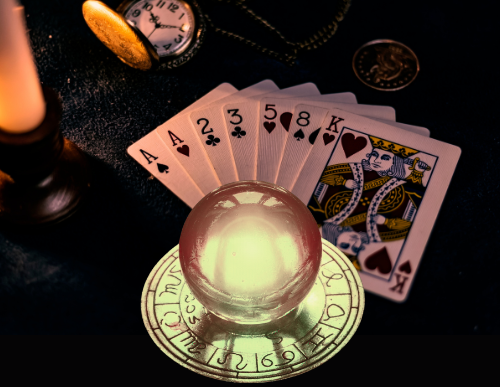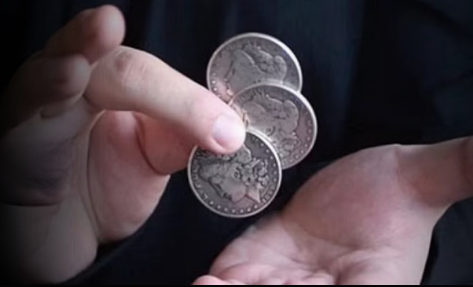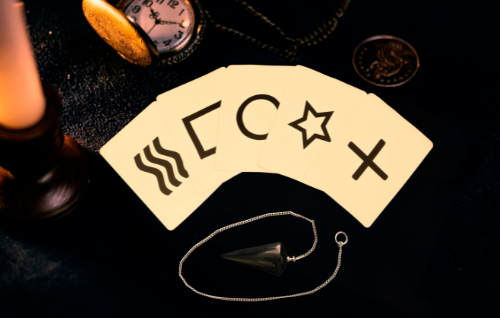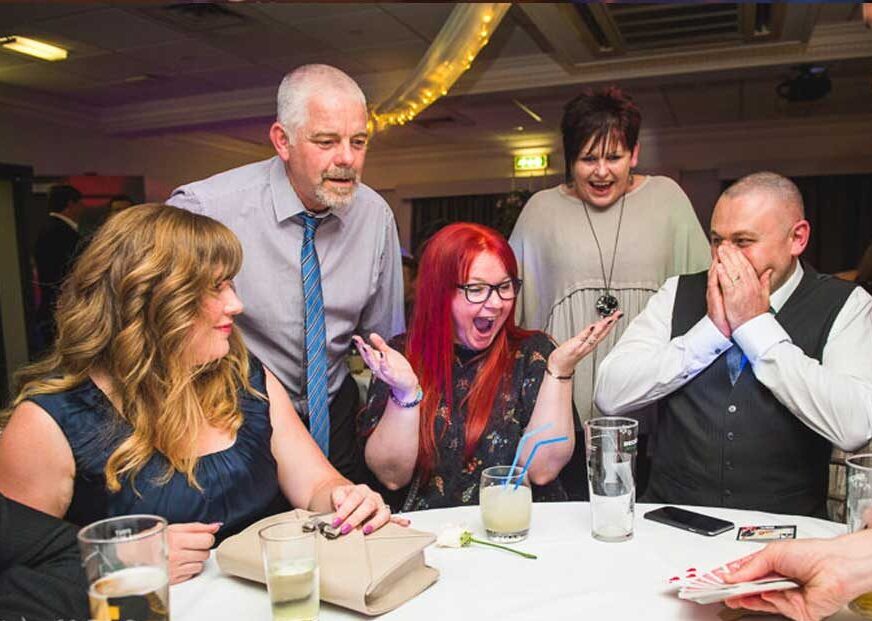The Difference Between Magic & Mentalism: Which one is right for your event?
01/06/25 – Written by Andrew Scott
Magic vs. Mentalism
As I am both a magician and a mentalist (magic and mentalism), people often ask me what the difference between the two is. Although both forms of entertainment provoke feelings of wonder, not to mention a lot of laughter, and both require similar skills to pull off successfully, they are fundamentally different.

Whether you’re a casual observer of AGT or Fool Us, or an aspiring magician yourself, you’ve probably come across the terms “magician” and “mentalist.” While they both conjure up images of wonder and awe, they are distinct branches of the magical arts. Especially when looking to book entertainment for a private event, you might be wondering, “What exactly is the difference between magic and mentalism?” Well, there’s a huge difference, but it’s not what you think.
Magic

Magic, whether performed on stage or close-up, is the ability to trick your audience into believing something has happened when it hasn’t, usually involving misdirection.
A very simple example is something most of us have done. When playing catch with a child or throwing a ball for a dog to chase, sometimes you pretend to throw the ball but hold onto it because it’s fun to watch their expression of bewilderment as they react to the throw.
It’s likely that, because they’re expecting the ball to travel in a certain trajectory, their brain will fill in the blank and make them believe that’s what they saw—then they realize that something’s not quite right and that they don’t know where the ball is.
In a sense, a magic trick is merely a much more sophisticated version of physical ability (sleight of hand) and misdirection.
Mentalism
Mentalism is a mixture of mind-reading and psychic ability. The best-known examples of mentalists are Derren Brown, who uses the science of psychology to create his act, and Uri Gellar, who gives the impression he has supernatural powers, most famously the ability to bend objects like, spoons, coins, and keys with his mind.

Like magic, mentalism relies on the art of misdirection, the power of suggestion, and the ability to read body language, as well as making the most of mathematics to help you achieve results. To a certain extent, it relies on people’s desire to believe (which is what makes clairvoyants’ lives a lot easier), and a good mentalist will be able to pick an audience member who is most likely to be taken in by their mind games.
The Secret: Both of these art forms require the same skill set!

In the world of magic, there’s room for both magicians and mentalists, because each can do the same thing. If a bartender can make a great old fashioned, odds are they can also make a pretty good mojito. While magicians dazzle us with their visual spectacle and sleight of hand, and mentalists tap into the depths of the human psyche, we use the same tools of misdirection and sleight of hand for both presentation styles.
Should you hire a Magician or a Mentalist?
While the concepts of magic and mentalism go hand in hand, there are still reasons to choose one over the other.
1. Audience Preferences: Consider the preferences and interests of your audience. Do they enjoy visual and physical illusions, or are they more intrigued by the mysteries of the mind? Mentalism can feel more “trendy” at the moment. But if it’s a corporate gathering or a wedding, classic sleight of hand can add some old-school charm and an element of sophistication to your event.
2. Interaction Level: Determine how much interaction you want between the performer and the audience. Mentalists often involve the audience more directly in their psychological experiments, creating a highly interactive experience. Depending on your group, that can be beneficial or detrimental.
3. Venue and Logistics: Evaluate the venue and logistics of your event. Some magic tricks may require more space or longer setup time, so make sure your chosen performer can accommodate the venue’s requirements.
Let's wrap this up…
There is one school of thought, which is that mentalists tend to be more skilled. Why? Because you can practice magic “tricks” in your room and perfect them, where as practicing mentalism requires an active observer. This means that if you’re claiming to have that skill set, you likely have a more robust repertoire and significantly more experience. But in the end, whether you choose a magician or a mentalist, you’re already guaranteeing a more enjoyable and memorable experience for your audience than most events.
If you’re unsure or want to offer a diverse experience, you could consider booking an entertainer like Andrew Scott, who does both. Not having to choose in advance can be a huge advantage, because he can read the room upon arrival and cater to a broader range of interests.
If you would like to learn more about how Andrew Scott can be of benefit to you at your next event, or are currently in need of entertainment, feel free to reach out to Andrew here: Contact Andrew



Read more about my services as a professional Mentalist and Magician at Andrewscottsmind.com